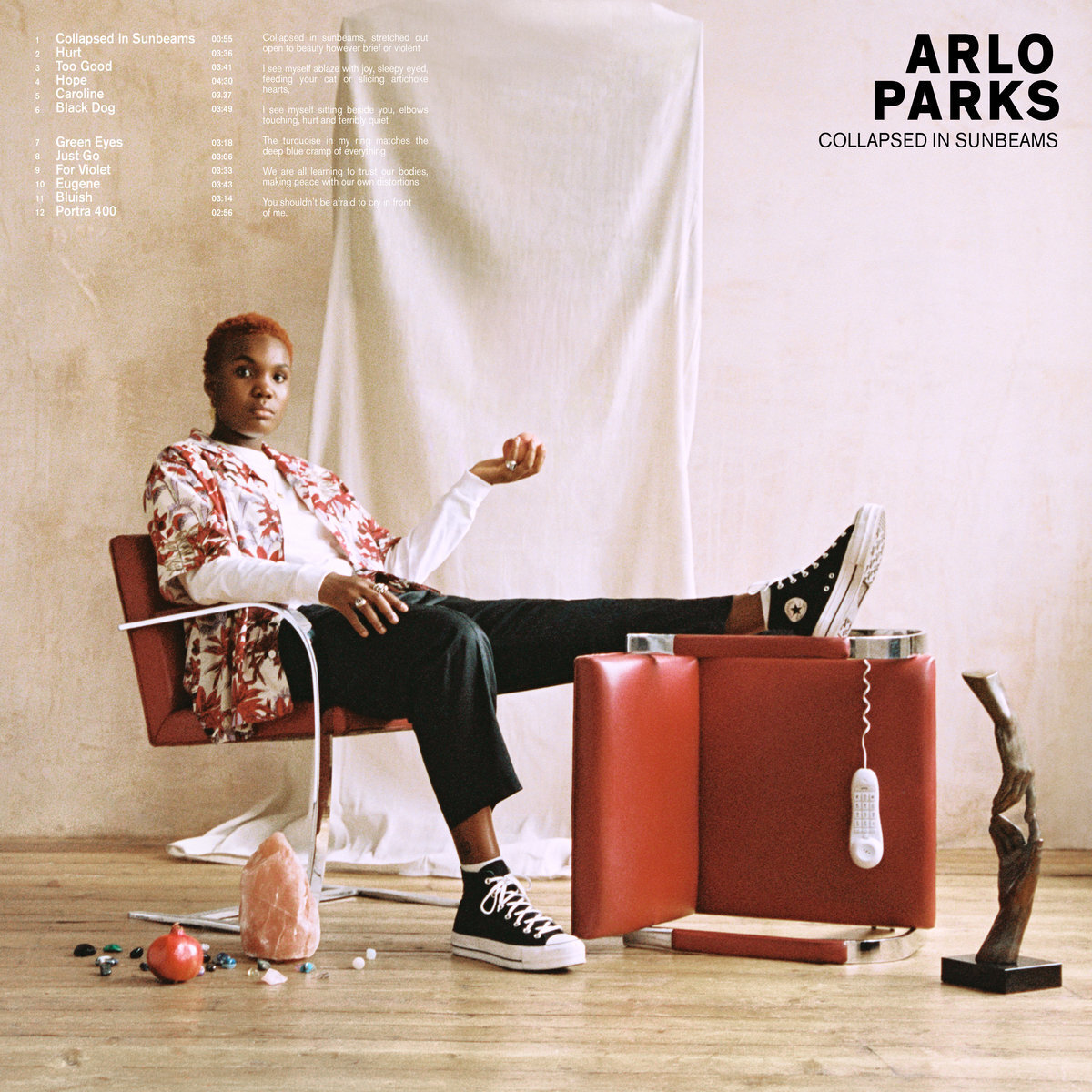
“Collapsed in Sunbeams” by Arlo Parks (Courtesy of Transgressive Records)
British singer-songwriter Arlo Parks made waves in the UK indie scene with the singles she released in the last two years. The 20-year-old’s poignant penmanship effortlessly pulls the listener into vivid scenes and immerses them in the emotional turbulence of adolescence within seconds. Two years later, her debut album “Collapsed in Sunbeams” showcases Parks at her best and reads like an audiobook for a slice-of-life poetry collection over the soundtrack of an indie coming-of-age movie.
Arlo Parks first started turning heads with her aptly named debut EP “Super Sad Generation” released in 2019. Later that year, she released her second EP “Sophie,” which captures and builds on everything that makes her debut EP special. The tracks in these EPs serve as different facets of an emotional state that echoes throughout young adults: a lack of direction, uncertainty and loss. Despite slowly becoming the voice of her generation, Parks’ writing reaches beyond her contemporaries as she captures not only the timely issues but also the core of the fleeting emotional rollercoaster of growing up into a young adult that everyone experiences in one way or another.
What sets Parks apart is her ability to capture the feelings of the characters in a scene and convey them concisely and profoundly. By using light, moody instrumentals that complement her lush vocals and the landscapes mentioned in her writing, she directs the listener’s attention to her strengths and transforms her poetry into a captivating experience.
Parks’ anticipated commercial debut “Collapsed in Sunbeams,” released Jan. 29, follows the tracks of her EPs and takes her craft to another level. The more mature and polished, yet still lo-fi and sincere presentation helps her display the growth in her artistic voice gained since her previous releases. Sonically, the album is heavily inspired by the lo-fi aesthetic of the late 90s and 2000s. Some of the instrumentals sound like they could have landed on a Slowdive, Portishead or early Radiohead record, yet they feel refreshing once Parks takes over and they turn into a backdrop for her vocals, helping to recreate scenes she reimagines from the era. The light guitar strumming and bright reverbs create a dreamy atmosphere that helps Parks redirect the listener’s attention from the events to the emotional states of the characters.
The album kicks off with the self-titled spoken-word piece, which summarizes the entire album in just six lines. The initially cryptic poem quickly turns into a lifelike scene, made up of vignettes from Parks’ memory. The minor details she deliberately chooses to focus on, as well as the overall haziness of the setting, makes it feel like a scene the listener is trying to pull from memory. This aspect of her writing sound inspired by dirty realist authors like Raymond Carver, whose voice is louder through what he chooses to leave to the reader’s interpretation rather than what he explicitly describes. She casually talks about emotional healing and a vague sense of pain during a seemingly mundane, slice-of-life moment.
“You shouldn’t be afraid to cry in front of me, I promise,” she says to end the poem, the first of many times she questions the meaning of relationships and the value of vulnerability.
A strong theme in the album is friendship, which is the focus of the two darkest tracks in the album. “Eugene” is a tale of the unrequited young love the narrator has for her straight female friend, while she comes to terms with the nature of their relationship. Parks questions the boundaries of romantic and friendly love, while she comforts her friend crying over her boyfriend, who the track is named after.
The other dark track is “Black Dog.” The song is about watching a friend going through depression, trying to help them heal and feeling helpless in this quest. Trying to get her friend out of the bed, Parks describes coming up with excuses to invite her outside, during which her desperation and heartbreak come off louder than what she is actually saying to her. Once again, Parks packs a heavy punch in the chorus, singing, “It’s so cruel what your mind can do for no reason.”
In the current landscape of music where the boundaries of genres blur and everybody sounds a little bit too much like each other, Arlo Parks effortlessly crafts a unique artistic voice for herself. Her immaculate lyrics, together with her captivating voice pull strong inspirations from poetry, contemporary American literature and spoken word. In “Collapsed in Sunbeams,” she combines the themes of the emotional turbulence of youth in a very mature and articulate way for her age. Combined with the perfect instrumentals to set the tone and her passionate vocal delivery, her words sculpt vivid, captivating stories.
Listen to “Collapsed in Sunbeams” here, and watch the music video for “Eugene” here.
Contact CU Independent Staff Writer Altug Karakurt at altug.karakurt@colorado.edu.
